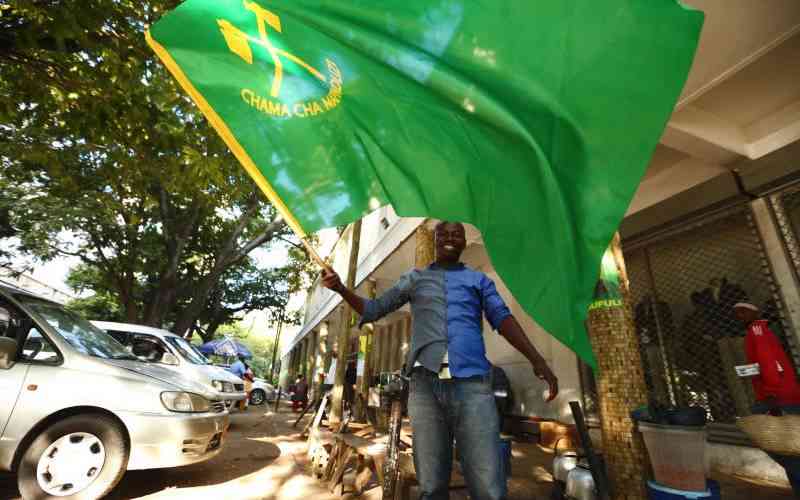Tanzania will hold a referendum in April on a new constitution, its Attorney-General said on Wednesday, angering opposition parties which boycotted the drafting process and reject the draft charter.
The row over the new constitution, which would replace one passed in 1977 when the east African Tanzania was under one-party rule, risks intensifying political divisions ahead of elections next year.
Main opposition party Chadema said it would ask a court to block the proposed constitution because it was passed without a quorum by an assembly dominated by the ruling Chama Cha Mapinduzi (CCM) party on Oct. 2.
The three main opposition parties walked out of the drafting body in April, saying President Jakaya Kikwete's CCM, which has been in power since Tanzania's independence from Britain in 1961, was ignoring their suggestions for political reforms.
"The referendum date is set on April 30, 2015. The campaign period shall commence on March 30 and end on April 28," Tanzania's Attorney General, Frederick Werema, told Reuters.
Werema said the government would hasten to update the electoral register to ensure the referendum goes ahead.
Before quitting the constitutional assembly, opposition parties and civil society groups had called for reforms including limiting presidential powers and the establishment of a federal system of government.
"We are consulting with our lawyers to mount a legal challenge against the passing of the draft constitution by the Constituent Assembly because there were gross irregularities in securing the required two-thirds majority to pass the constitution," John Mnyika, Chadema's deputy secretary general told Reuters on Wednesday.
"We also cannot expect a credible outcome of the referendum on the new constitution if it will be conducted without having in place an independent electoral commission."
The draft on which Tanzanians will vote retains some opposition proposals, including the establishment of an independent electoral commission and allowing for the first time legal challenges to presidential election results.
The new basic law also sets a limit on how many cabinet ministers can appointed by the president, introduces a 50-50 gender representation in parliament and gives women equal land ownership rights with men.
Tanzania will hold presidential and parliamentary elections next year. No date has yet been announced but previous polls have been held in October. Kikwete cannot run again after serving two terms as president.
The opposition is seeking to challenge the dominance of CCM, which has won all four elections since its one-party rule ended in 1995.
Opposition parties have made ground in recent polls although divisions between them have long hampered their effectiveness. They say they have now begun talks to name a single presidential candidate next year.
Stay informed. Subscribe to our newsletter
 The Standard Group Plc is a
multi-media organization with investments in media platforms spanning newspaper
print operations, television, radio broadcasting, digital and online services. The
Standard Group is recognized as a leading multi-media house in Kenya with a key
influence in matters of national and international interest.
The Standard Group Plc is a
multi-media organization with investments in media platforms spanning newspaper
print operations, television, radio broadcasting, digital and online services. The
Standard Group is recognized as a leading multi-media house in Kenya with a key
influence in matters of national and international interest.
 The Standard Group Plc is a
multi-media organization with investments in media platforms spanning newspaper
print operations, television, radio broadcasting, digital and online services. The
Standard Group is recognized as a leading multi-media house in Kenya with a key
influence in matters of national and international interest.
The Standard Group Plc is a
multi-media organization with investments in media platforms spanning newspaper
print operations, television, radio broadcasting, digital and online services. The
Standard Group is recognized as a leading multi-media house in Kenya with a key
influence in matters of national and international interest.





